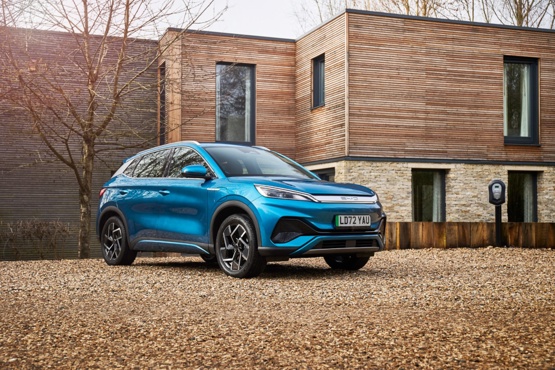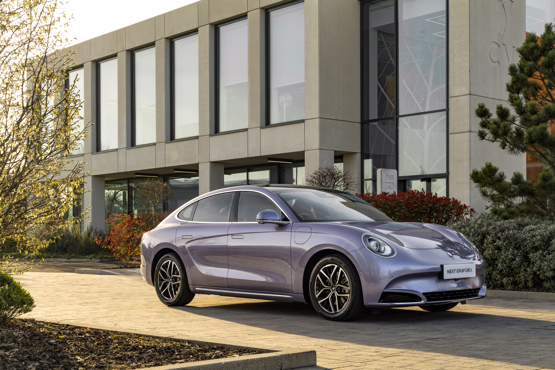Author: Sepi Arani, Carwow UK commercial director
For anyone still in doubt that Chinese carmakers will make a lasting footprint on the UK car market in the not-so-distant future, let me assure you; their ascendance is imminent.
Chinese brands already dominate the fast-growing electric vehicle (EV) market with 60% of global sales. Moreover, China has become the largest exporter of cars, surpassing Japan.
Earlier this year, most European senior automotive executives were sceptical about the short-term threat posed by Chinese rivals; the Shanghai Auto Show in April changed all of that.
Many of the European bosses attending the show witnessed the quality of the Chinese cars being debuted and the ambitious global expansion plans of Chinese executives.
However, UK dealer sentiment towards Chinese brands is varied.
In a recent carwow survey, 73% of dealers said they think Chinese manufacturers will capture up to 10% of UK car sales in the next year, while one in three believe they’ll hold a 21-30% market share within the next five years.
Meanwhile, just one in five (20%) said they feel they currently know enough about Chinese carmakers and their plans for the UK market.
Until now, the UK has taken comfort from the fact that adapting vehicles for right-hand drive has slowed their arrival, with many brands choosing to launch across mainland Europe with left-hand drive offerings.
Recently, though, several Chinese manufacturers, including brands such as BYD, Nio and GWM’s Ora, have hinted at their UK-specific strategies.
So, what is Carwow seeing Chinese OEMs doing?

1. Leveraging dealer relationships to establish themselves
Everything suggests that most Chinese OEMs setting their sights on the UK new car market will operate in partnership with UK dealers, either by establishing new franchise networks or through an agency model. Despite widespread speculation, only a small minority are currently looking to sell direct like Tesla has done.
The motivation for working with dealers in this way comes from the recognition that sales success relies upon quickly building trust among consumers. With little or no brand profile, Chinese OEMs will want to leverage dealers’ relationships and reputations to alleviate any concerns and be available to deliver aftersales support.
A prime example of this approach is GWM, which partners with International Motors (IM), to sell the Ora Funky Cat. IM, known for distributing Subaru and Isuzu vehicles, has utilised its network partners and marketing expertise to launch the GWM brand successfully. As more Chinese brands enter the UK market, we think similar strategies will be employed.
2. Using the fleet market to test and learn at scale
While some European carmakers have been retreating from the UK fleet market – accelerated by supply constraints that have prompted a shift towards more profitable retail sales – Chinese counterparts see the business, fleet and short-cycle rental markets as a means to drive volume. But, that’s only one part of the motivation.
Crucially, fleet sales also give them the opportunity to increase brand visibility, and even conduct real-world field testing of in-car technologies. By entering the fleet market, they can also gather feedback and refine technologies through over-the-air updates, a strategy commonly used by Chinese consumer technology brands.
3. Investing early to keep a handle on costs
Chinese OEMs are years ahead of Western brands in terms of EV-specific supply chains and this is how they are able to offer such high-quality products at lower prices. BYD invested in lithium mining back in 2011, allowing them to reach economies of scale faster and reduce manufacturing costs.
It takes 11 years to build a lithium mine, so any OEM that hasn’t already established supply of this vital component to EV batteries is behind the curve. And, given that the battery of an EV can account for up to 40% of the cost, securing a stable supply of lithium is crucial for competitive pricing.

4. Developing an understanding of UK consumer motivations
As the Korean marques will attest, winning over UK consumers takes time and accessible pricing is necessary to secure a foothold.
While some Chinese brands currently cater to the budget end of their domestic market, they aspire to enter the UK market with competitive pricing comparable to lower-premium brands like Volkswagen.
However, they may need to adapt to market conditions during the initial phase. MG, a Chinese-owned brand with an established brand presence, has demonstrated that attractive pricing is essential for capturing UK consumers’ interest.
There is strong demand in the UK for affordable EVs, and Chinese OEMs are capable of offering EVs priced below £10,000. That said, it still remains to be seen whether Chinese brands will favour higher profit margins.
Beyond price, one in 10 of the car buyers we polled recently said they associate Chinese cars with ‘more and better’ technology.
When asked what would ultimately persuade them to consider a Chinese car, one in five (21%) of car-buyers said they wanted ‘more time’, indicating that consumers want to build up more familiarity with and trust in the new Chinese brands as they establish themselves over the next few years.
Notably, a lack of familiarity with Chinese brands was cited by 28% of drivers as a reason to not consider a Chinese car.
Chinese brands will succeed in the UK
So where does that leave us? With the 2030 deadline on ICE cars looming, Chinese OEMs who solely manufacture electric vehicles have an inherent advantage.
Many legacy brands are still in transition; phasing out ICE production and ramping up EV output, but they have not yet reached the economies of scale required to compete.
It’s clear that the Chinese OEMs have the products, the resources and the will to succeed in the UK. However, our consumer research shows that whichever strategies they take to market, they’ll need to focus on establishing a strong brand presence and foster the trust, loyalty, and purchasing power of British consumers. This will all require time and dedication. Will they demonstrate the same patience that has yielded substantial rewards for their Korean competitors? We’ll have to wait and see.
All copyrights for this article are reserved to UK Recruiter

